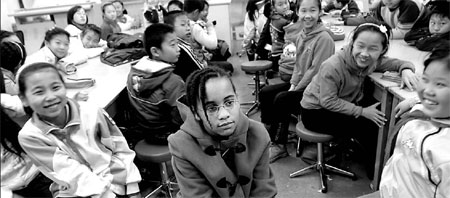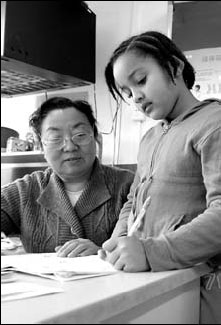Stuck in the middle with you
|
Jasmine Khutsoane-Hinto's theatrical calmness before the camera makes her class burst into laughter. |
Jasmine and Camille Khutsoane-Hinto have studied history in London, geography in Botswana and mathematics in China. These youngsters have already enjoyed a unique international classroom experience across three continents and have not even reached their teens.
The sisters are part of a small group of young expats who attend Chinese public schools rather than expensive international institutions.
Their Botswanan-born mother, Tebby, says a local school provides a wonderful educational opportunity, especially in helping her daughters learn the language.
"I knew intellectually it would be fascinating for them but I also knew that emotionally I would have to be there for them," she says.
"I wanted them to have the authentic China experience and I felt that they were not picking up Chinese quickly or effectively enough.
"They know that they have better opportunities here and they are slowly making friends."
Jasmine is the oldest and is prone to theatrical outbursts, her mother says.
Her sister Camille is a cheeky 8-year-old and also a proud left-hander.
Both girls were enrolled into a Beijing public school in September after attending an international school where foreign passport holders were taught separately from their Chinese counterparts.
The culture and the atmosphere of the two types of schools are as different as the fees. Private international schools cost about 100,000 yuan ($14,500) a year while a public school can cost just 17,000 yuan ($2,500).
And there are other differences. "There is lots of marching for some reason," Jasmine says.
Tebby says her daughters have to undertake Physical Education (PE), which involves marching in the morning and the girls even have to carry out chores, such as cleaning the classroom.
"I don't put too much pressure on them," Tebby says.
"I don't say that they have to speak fluent Chinese and have to do everything. But they are getting an experience of China for themselves and no one can take that away from them."
Education for expat children can be a conundrum for parents. Do they educate their children in an unfamiliar Chinese system that provides a unique insight into the culture, society and language?
Or do they enroll their children at an expensive international school, which gives students internationally recognized credentials and a multinational atmosphere, but is more removed from the local environment?
"It is really difficult," Camille says, recalling her first day at the school.
"I sat down and didn't understand a word that my teacher was saying to me."
The girls say the Chinese classes are stricter than schools they have attended in the West, and they are also aware of the different treatment they receive because of their foreign status.
"I think that they have to work harder than children in the West," says Tebby, who speaks a little Chinese.
"They have to produce 5,000 characters, and I can't even read some of their questions that they get for their homework."
|
Like many expat children, Camille has to work hard to catch up with her study in a Chinese school. Photos by Jiang Dong |
But the girls say they miss their friends from their previous school and find it harder to make new friends because of the language barrier.
"I think it can be a bit lonely at times because they do not yet understand everything that is being said," Tebby says.
"But it's invaluable. We are really seeing how people in China live and can be empathetic in a way that would not have been possible without this experience.
"We want to learn more about China," says Australian-born Sean, the girls' father.
He says the family as a whole is also benefiting from his children's schooling. "I find that in the West children grow up so quickly," he says.
Tebby says her daughters can also enjoy being young, and not have to worry about having the latest mobile phone on the playground like they did in London.
"Here they do not have to worry about the latest fashion or trends," she says before slipping back into her native Botswana tongue to scold her girls.
The family also speaks Chinese in the house.
"We love messing around in Chinese at home," she says.
"Camille knows how to say little things like 'what's wrong with you then?' in Chinese, things that I don't know how to say."
In June this year the family visited Jwaneng, a small mining town in Botswana in the south of Africa, where Tebby was born and the girls' grandmother still lives.
To the family's surprise, a Chinese family from the mainland had recently immigrated to the town and had set up a business.
"I don't want to say, 'Oh I lived in China for a couple of years but I can't speak Chinese'," Jasmine says.
In Botswana, Tebby enrolled the children into a course in the local village so they would have yet another insight into a different education.
"I wanted them to have the experience of going to school in Botswana when we went back," he says.
"I think that experience was even tougher than school in China.
"But today I don't have to drag them kicking and screaming to school."
(China Daily 12/08/2008 page8)
















